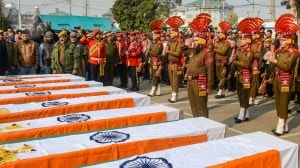Pak holding out nuclear threat: Fernandes
NEW DELHI, JANUARY 5: India on Wednesday accused Pakistan of holding a nuclear threat to it in its continued delusion that it could wrest ...

NEW DELHI, JANUARY 5: India on Wednesday accused Pakistan of holding a nuclear threat to it in its continued delusion that it could wrest Kashmir without facing any challenge.
"They (Pakistan) held out a nuclear threat to us on May 31, 1999, and did it again on Tuesday without absorbing the real meaning of nuclearisation, that it can deter only the use of nuclear weapons, but not conventional war," Defence Minister George Fernandes said.
Referring to Pakistan’s military ruler General Pervez Musharraf’s comments on Tuesday that Pakistan would use nuclear weapons if it was threatened, Fernandes said, "Musharraf’s intentions had not percolated even to the people of Pakistan."
The Defence Minister, after inaugurating a national seminar on Challages of Limited War’, told reporters that after the nuclear test in May 1998, Pakistani elite started believing that India will be deterred from fighting back in any war.
"There was a perception in Pakistan that nuclear status had ensured it that the covert war would continue and aggression across the LoC (Line of Control) could be carried out and India would be deterred by the nuclear factor," he said.
Terming it as the worst error of judgement by Pakistan, Fernandes drew the attention of Pakistani rulers to similar follies committed by Russia and China – both nuclear weapon states – during the 1969 bitter Ussuri river border clashes’, which were prolonged.
"So the issue is not that war has been made obsolete by nuclear weapons, and that covert war by proxy is the only option, but that conventional war remained feasible, but with definite limitations if escalation across the nuclear threshold is to be avoided," Fernandes said.
Emphasising that future wars would be "limited wars" unlike total wars like the first and second World Wars, the Defence Minister said that countries like China have in their military doctrine been projecting that future wars would be "local border wars".
He said that India’s success and grasp of limited war was due to the ability of its defence forces to fight and win such a war at a time, ground and means of fighting chosen by the aggressor.
"If India can beat a professional military force equipped with modern firepower, at the ground (with Pakistani forces at dominating heights) and time of Pakistan choice, with the initiative also in their hands, India can beat Pakistan anytime, anywhere," Fernandes said.
He said Pakistan’s continued role in breeding terrorism was bringing it near to being declared a rogue state’ and this was being increasingly noticed by the international community.
Fernandes expressed disappointment at the US continuing to turn a blind eye on the issue. "US has to be made to realise terrorism knows no borders. They (US) aim at Osama Bin Laden but overlook what is being done in India by Pakistan," he said.
Stressing on the nature of conflicts the defence forces may have to face in future, the Defence Minister said the type of military forces that India has should be able to meet the new challenges that might be thrown up.
He said the most important reason for this was the nuclearisation of our security environment. "We need therefore to ensure that a conventional war, if imposed on us in future, is kept below the nuclear threshold. This will require close examination of our doctrine, defence strategy and force structure."
Fernandes said India would require to have a requisite deterrence strategy at the conventional as well as nuclear levels and efforts to devote continuing attention to this.
Presiding over the inaugural session of the seminar organised by the Institute for Defence Studies and Analysis, attended by the naval and air chiefs and other top services brass, K Subramanyam, defence expert, cautioned the nation that the time had come to recognise the fact that India was in a "long war with Pakistan since 1947".
"Incidents like Kargil, recent hijacking, the continuous terrorism in Kashmir and Punjab are all part of this long war," he said.



- 01
- 02
- 03
- 04
- 05



























